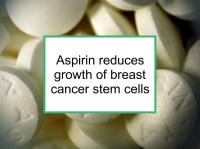While not all studies are in agreement, regular aspirin (acetyl salicylic acid) use has been found to be associated with reduced breast cancer risk. Aspirin use after diagnosis has also been linked to less recurrence and breast cancer-specific mortality. In fact, aspirin appears to be more effective in preventing breast cancer's spread.
Now a new study has explained how aspirin can inhibit breast cancer growth and metastasis. Preliminary evidence suggests that aspirin might enhance the effectiveness of tamoxifen. However, aspirin should not be used during chemotherapy since aspirin might interfere with its treatment effects.
In addition, regular aspirin use has potentially serious side effects, including gastrointestinal bleeding, hemorrhagic stroke, and age-related macular degeneration.
Aspirin is preferable to other over-the-counter pain medications
Aspirin reduces breast cancer risk in part by reducing inflammation and inhibiting COX-2 overexpression. NSAIDs (nonsteroidal anti-inflammatory drugs) such as aspirin act by blocking the production of prostaglandins, of which COX-2 is one. Aspirin also can reduce circulating sex steroid hormone levels that are associated with increased ER+ breast cancer risk. Aspirin has also been reported to inhibit aromatase activity (in which androgens are converted to estrogens in the body).
For those who can tolerate its side effects, aspirin is a better choice for pain relief and fever reduction than other over-the-counter pain relievers, including acetaminophen, ibuprofen, and naproxen. Studies have reported that these pain medications either have little or no association with reduced breast cancer risk or are associated with increased risk:
- Acetaminophen (Tylenol), which is not an NSAID, has not been found to be associated with risk of breast cancer or recurrence in most studies.
- Recent use of ibuprofen (Advil, Motrin) was found to be associated with a 1.3-fold increased risk of hormone receptor positive (ER+/PR+) breast cancer in one study. Another study reported that long-term daily use of ibuprofen was associated with an 1.5-fold increased risk of breast cancer, particularly of stage II or higher and lymph node positive disease.
- Although recent data is limited, naproxen (Aleve) appears to have either a small or no effect in preventing breast cancer. Naproxen should not be taken during doxorubicin chemotherapy since it has been shown to increase doxorubicin-induced heart damage (cardiomyopathy).
Latest research explains anti-metastatic action of aspirin
The study referenced at the beginning of this news story was designed to investigate how aspirin prevents breast carcinogenesis and metastasis. Limited knowledge as to the mechanism of action of aspirin has colored the debate of the possible risks and benefits of using aspirin for breast cancer prevention and treatment. The authors used cell studies and animal models to investigate the beneficial effects of aspirin in breast cancer.
Aspirin was shown to prevent breast cancer cell growth and tumor growth in mice bearing tumor grafts through the induction of programmed cell death (apoptosis). Aspirin also significantly reduced the self-renewal capacity and growth of breast cancer stem cells (breast tumor-initiating cells) and delayed the formation of palpable tumors.
Aspirin was also shown to regulate other events in breast cancer development. Aspirin reprogrammed the mesenchymal to epithelial transition (MET). (Mesenchymal cells are able to develop into the tissues of the various tissues throughout the body. MET is a process that converts mesenchymal cells to epithelial cells.)
Aspirin also delayed breast cancer cell migration. The authors hypothesize that the tumor growth inhibition and reprogramming effects of aspirin could be the result of inhibition of TGF-β/SMAD4 signaling pathway. This pathway is associated with growth, ability of cells to move, invasion, and metastasis in advanced breast cancer.
The authors conclude that aspirin has the potential to prevent or treat breast cancer through its ability to attack possible targets such as TGF-β in breast carcinogenesis.
Please see our article on aspirin for more information.
